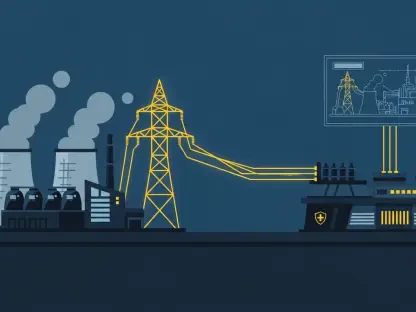Overview of a Vital Energy Partnership
In a region where energy security remains a pressing concern, the cross-border power supply relationship between India and Bangladesh stands as a critical pillar of mutual economic growth, driven by the urgent need to meet rising electricity demands. This partnership has seen significant collaboration over the years, with India playing a pivotal role in addressing Bangladesh’s energy shortfall. Such arrangements not only bolster regional stability but also highlight the intricate balance of international cooperation in the energy sector.
At the heart of this collaboration is Adani Power, a major player supplying electricity through its 1,600-megawatt Godda coal-fired plant in eastern India. This facility alone contributes nearly 10% of Bangladesh’s total electricity needs, underscoring its importance to the nation’s energy grid. The scale of this contribution reflects the strategic value of private entities in bridging energy gaps across borders.
However, managing such international contracts brings inherent complexities, including financial obligations, regulatory differences, and geopolitical nuances. While these partnerships are vital for energy security, they often face challenges in aligning expectations and ensuring equitable cost-sharing. The current dispute between Adani Power and Bangladesh authorities exemplifies how critical yet delicate these arrangements can be.
Background of the Payment Dispute
Roots of the Disagreement
The ongoing conflict between Adani Power and the Bangladesh Power Development Board (BPDP) traces back to a 2017 power purchase agreement (PPA) that governs the supply terms from the Godda plant. Discrepancies in interpreting key cost components have fueled tensions, with both sides holding differing views on billing calculations. This misalignment has led to a prolonged standoff over financial terms.
A significant point of contention is the accusation that Adani Power has not passed on tax benefits it received in India to Bangladesh, as stipulated under the agreement. This has resulted in a tariff rate of 14.87 taka per unit, notably higher than the average of 9.57 taka per unit charged by other Indian suppliers. Such disparity has intensified scrutiny over fairness in pricing mechanisms.
Beyond tariffs, broader issues of contractual clarity and compliance have surfaced, with Bangladesh questioning whether all obligations under the PPA have been met. These unresolved matters have not only strained financial dealings but also raised concerns about the transparency of cross-border energy contracts. The situation underscores the need for precise terms to prevent such disputes from arising.
Current Status of Overdue Payments
On a positive note, there has been measurable progress in addressing the financial backlog. The pending dues, which once peaked at nearly $2 billion, have been reduced to $900 million as of mid-2025, now equivalent to just 15 days of tariff. This reduction signals a concerted effort to alleviate the immediate fiscal burden on both parties.
Despite this advancement, lingering billing disagreements continue to cast a shadow over the relationship. The remaining disputes center on specific cost elements and interpretations of the PPA, which have yet to be fully reconciled. This partial resolution highlights the urgency of addressing root causes to prevent future accumulations of debt.
Looking ahead, the focus remains on sustaining this momentum while tackling the unresolved financial intricacies. The progress made so far offers a foundation for confidence, yet it also emphasizes that without a comprehensive agreement, the risk of recurring issues looms large. Both sides appear motivated to find a lasting solution.
Challenges in Resolving the Dispute
Navigating the path to resolution has proven to be a formidable task, primarily due to ambiguities within the original contract. Disparities in how tariff calculations are understood and applied have created a persistent deadlock, with neither party willing to concede on key financial interpretations. This situation reveals the pitfalls of unclear contractual language in international agreements.
Beyond the specifics of this case, broader challenges in cross-border energy deals come into play, such as reconciling local policies and tax regulations. Ensuring fairness in cost-sharing across jurisdictions often becomes a sticking point, as each nation operates under distinct legal and economic frameworks. These systemic differences complicate efforts to reach a consensus.
Potential strategies to overcome these hurdles include structured negotiations that prioritize transparency and formal dispute resolution mechanisms like arbitration. Establishing clear communication channels and involving neutral third parties could help bridge gaps in understanding. Ultimately, addressing these obstacles requires a commitment to flexibility and a shared vision for equitable collaboration.
Approaches to Dispute Resolution
Adani Power has taken a decisive step by opting for international arbitration to settle the ongoing payment dispute. This move reflects a preference for a formalized process to ensure clarity and enforceability of outcomes, potentially expediting a resolution. It also demonstrates the company’s intent to adhere to structured legal avenues for addressing grievances.
In contrast, Bangladesh’s interim government, as articulated by de facto power minister Muhammad Fouzul Kabir Khan, leans toward continued negotiations, viewing arbitration as a measure of last resort. This approach suggests a desire to maintain diplomatic dialogue and avoid escalation, prioritizing a collaborative resolution over a confrontational one. The difference in strategies highlights varying levels of urgency and risk tolerance.
Despite these divergent paths, both parties express a commitment to preserving their partnership. Adani Power has reiterated its dedication to supplying reliable and cost-competitive electricity, while Bangladesh acknowledges the importance of this energy lifeline. This mutual resolve provides a hopeful backdrop for finding common ground, whether through arbitration or sustained talks.
Future Implications for Cross-Border Energy Agreements
The outcome of this dispute could set a significant precedent for future international energy partnerships, particularly between India and Bangladesh. A resolution—whether through arbitration or negotiation—may influence how contracts are drafted, with a likely emphasis on clearer terms and predefined mechanisms for handling disagreements. This case serves as a reminder of the importance of foresight in agreement structures.
Emerging challenges, such as ensuring transparency in cost calculations and addressing policy changes like tax benefits, will need careful consideration in future deals. Opportunities also arise to establish robust frameworks that can adapt to fluctuating economic conditions or regulatory shifts. Learning from current tensions could lead to more resilient energy collaborations.
Additionally, the role of arbitration and negotiation in this scenario underscores their value as tools for conflict resolution in the global energy market. As dynamics in this sector continue to evolve, with increasing demand and sustainability pressures, the ability to resolve disputes constructively will be paramount. This dispute may thus pave the way for more standardized approaches to managing cross-border energy ties.
Conclusion and Outlook
Reflecting on the journey of this payment dispute, the strides made in reducing overdue amounts from a staggering high to a more manageable figure stand out as a testament to pragmatic efforts by both Adani Power and the Bangladesh authorities. The nuanced approaches to resolution—arbitration versus continued dialogue—reveal a shared determination to address underlying issues of fairness and transparency, even if through different means. Each step taken illuminates the complexities of international energy contracts and the critical need for precision in their execution.
Looking back, the experience underscores actionable lessons for strengthening such partnerships. Crafting clearer contracts with explicit terms on cost-sharing and tax benefits emerges as a vital takeaway to prevent similar conflicts. Establishing predefined dispute resolution frameworks also proves essential to ensure swift and fair outcomes without derailing critical energy supplies.
Moving forward, stakeholders should prioritize sustained collaboration by investing in regular policy alignment discussions and joint reviews of agreement terms. Creating a platform for ongoing dialogue could preempt misunderstandings, while adopting neutral mediation as a first step before formal arbitration might balance efficiency with diplomacy. These steps, grounded in the insights gained, offer a pathway to not only resolve the current standoff but also fortify future cross-border energy endeavors against unforeseen challenges.









